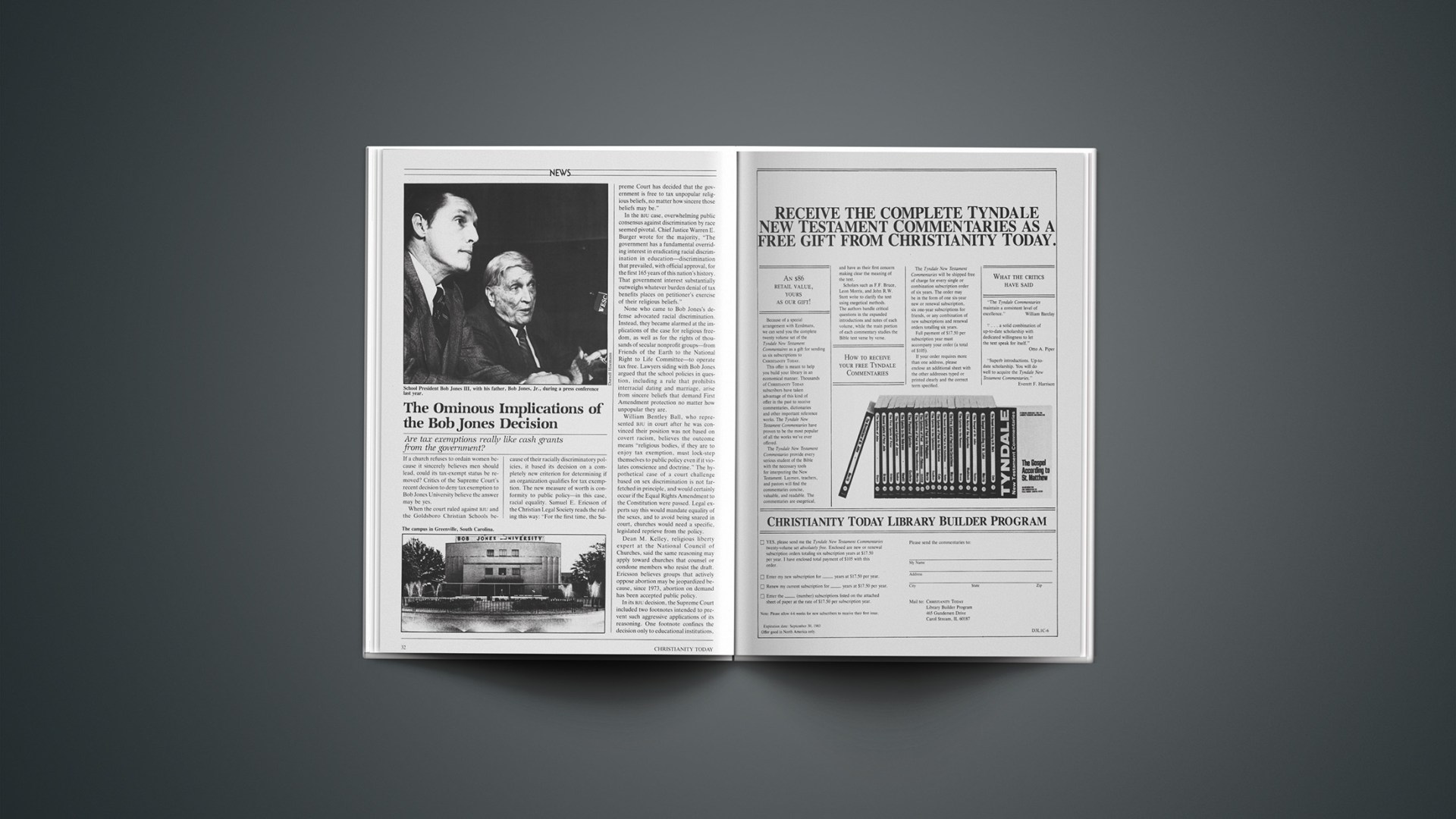Are tax exemptions really like cash grants from the government?
If a church refuses to ordain women because it sincerely believes men should lead, could its tax-exempt status be removed? Critics of the Supreme Court’s recent decision to deny tax exemption to Bob Jones University believe the answer may be yes.
When the court ruled against BJU and the Goldsboro Christian Schools because of their racially discriminatory policies, it based its decision on a completely new criterion for determining if an organization qualifies for tax exemption. The new measure of worth is conformity to public policy—in this case, racial equality. Samuel E. Ericsson of the Christian Legal Society reads the ruling this way: “For the first time, the Supreme Court has decided that the government is free to tax unpopular religious beliefs, no matter how sincere those beliefs may be.”
In the BJU case, overwhelming public consensus against discrimination by race seemed pivotal. Chief Justice Warren E. Burger wrote for the majority, “The government has a fundamental overriding interest in eradicating racial discrimination in education—discrimination that prevailed, with official approval, for the first 165 years of this nation’s history. That government interest substantially outweighs whatever burden denial of tax benefits places on petitioner’s exercise of their religious beliefs.”
None who came to Bob Jones’s defense advocated racial discrimination. Instead, they became alarmed at the implications of the case for religious freedom, as well as for the rights of thousands of secular nonprofit groups—from Friends of the Earth to the National Right to Life Committee—to operate tax free. Lawyers siding with Bob Jones argued that the school policies in question, including a rule that prohibits interracial dating and marriage, arise from sincere beliefs that demand First Amendment protection no matter how unpopular they are.
William Bentley Ball, who represented BJU in court after he was convinced their position was not based on covert racism, believes the outcome means “religious bodies, if they are to enjoy tax exemption, must lock-step themselves to public policy even if it violates conscience and doctrine.” The hypothetical case of a court challenge based on sex discrimination is not farfetched in principle, and would certainly occur if the Equal Rights Amendment to the Constitution were passed. Legal experts say this would mandate equality of the sexes, and to avoid being snared in court, churches would need a specific, legislated reprieve from the policy.
Dean M. Kelley, religious liberty expert at the National Council of Churches, said the same reasoning may apply toward churches that counsel or condone members who resist the draft. Ericsson believes groups that actively oppose abortion may be jeopardized because, since 1973, abortion on demand has been accepted public policy.
In its BJU decision, the Supreme Court included two footnotes intended to prevent such aggressive applications of its reasoning. One footnote confines the decision only to educational institutions, excluding churches. The other limits the “public policy” criterion to widely agreed-upon norms that are beyond dispute. Questions are being raised, though, about whether this affords adequate protection from litigation. Forest Montgomery, counsel for the National Association of Evangelicals, said, “The court has tried to chain the tiger, but lawyers will try to run with it anyway.”
Concern about religious freedom has been heightened as well by another Supreme Court decision handed down the day before the BJU ruling. In a unanimous opinion written by Justice William Rehnquist—the only one to dissent from the BJU ruling—the Court referred to tax exemption as a form of government subsidy. Rehnquist wrote, “A tax exemption has much the same effect as a cash grant to the organization of the amount of tax it would have to pay on its income.”
To Dean Kelley, this is an ominous turn of events. He said “henceforward tax-exempt organizations will have to justify exemption as though it were a subsidy” by proving that they serve a public purpose and do not violate public policy. “That poses some serious problems for churches,” Kelley said. “The most alarming possible conclusion is that if exemption is a subsidy, then churches are not entitled to it at all.” However, the court has found previously that churches are entitled to exemption.
The Constitution prohibits church-state entanglement, and this is the reason churches have always been exempt from taxes. Ericsson of the Christian Legal Society said the concept is that state and church are in two separate spheres, where neither may hold sway over the other. Ericsson believes the trend is toward the state becoming “the owner of the public good” rather than “the guardian of the public good.”
The BJU decision may be opportune for those, such as the American Civil Liberties Union, who already oppose church tax exemption across the board. Ball says the court’s new perspective on exemption may “release a new wave of anti-church legal activity” and deserves a swift “counterpunch” from church groups.
Concern about the broader implications of the decision is not limited to separatists, fundamentalists, or even conservatives. In a Washington Post opinion column, staff court reporter Fred Barbash wrote that the Supreme Court’s rationale “gives the federal judiciary a creative license with unlimited possibilities for the exercise of judicial power.” The American Baptist Churches and the Baptist Joint Committee on Public Affairs pointed out in a friend-of-the-court brief that “the state has no role to play in establishing criteria for fellowship and … cannot force its way into such a role through threatening the loss of tax exemption.”
A lower court had determined that BJU was primarily a religious, rather than educational, institution. This finding set off alarm bells among numerous advocates of church-state separation, and the fact that the Supreme Court virtually ignored this aspect of the case disturbed them greatly.
At BJU, president Bob Jones III reacted to the decision by saying, “From now on we are living in an age where the church is merely tolerated if it serves the government’s purpose. Our nation from this day forward is no better than Russia insofar as being able to expect the blessing of God.”
The school teaches a form of fundamentalism that places great emphasis on separation from those who hold different beliefs, and they tend to interpret the Bible in ways with which few other Christians fully agree. Until 1975, blacks were not admitted to the school. Now, a policy prohibits interracial dating by students or faculty and excludes people involved in mixed-race marriages. Spokesmen for the school say they believe Scripture commands racial purity. At the Goldsboro Christian Schools, which also were part of the case, blacks are still not admitted.
BJU tax troubles began in 1971, when the Internal Revenue Service denied tax exemptions to about 100 private schools that discriminate by race. These schools, along with hundreds of thousands of other nonprofit groups, are classified by the IRS as 501(c)(3) institutions (from the section of the IRS code that describes them), exempt from paying federal tax and able to receive tax-deductible contributions from their supporters.
When Congress declared the guidelines for this classification, it did not specify that a tax-exempt group must adhere to a nondiscrimination policy. The Supreme Court construed that “congressional intent” despite congressional silence on the subject, saying that “ratification by implication” was clear due to other legislation that condemns racial discrimination. This leap of logic troubled Justice Lewis F. Powell. Jr., who concurred with the majority but wrote a separate statement. “The contours of public policy should be determined by Congress, not by judges or the IRS,” Powell wrote.
The loss by BJU represents an unquestioned gain for the cause of racial equality, but to arrive there, the Court appears to have trampled upon the freedom of other tax-exempt groups to believe and act on unpopular convictions.
BETH SPRING










